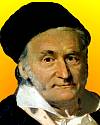 (source)
(source)
|
Carl Friedrich Gauss
(30 Apr 1777 - 23 Feb 1855)
German mathematician who transformed nearly all areas of mathematics, and contributed much to other areas of science.
|
Carl Friedrich Gauss Quotes on Mathematics (19 quotes)
>> Click for 52 Science Quotes by Carl Friedrich Gauss
>> Click for Carl Friedrich Gauss Quotes on | Biography | Education | Number |
>> Click for 52 Science Quotes by Carl Friedrich Gauss
>> Click for Carl Friedrich Gauss Quotes on | Biography | Education | Number |
A great part of its [higher arithmetic] theories derives an additional charm from the peculiarity that important propositions, with the impress of simplicity on them, are often easily discovered by induction, and yet are of so profound a character that we cannot find the demonstrations till after many vain attempts; and even then, when we do succeed, it is often by some tedious and artificial process, while the simple methods may long remain concealed.
— Carl Friedrich Gauss
Quoted in H. Eves, Mathematical Circles (1977) .
As is well known the principle of virtual velocities transforms all statics into a mathematical assignment, and by D'Alembert's principle for dynamics, the latter is again reduced to statics. Although it is is very much in order that in gradual training of science and in the instruction of the individual the easier precedes the more difficult, the simple precedes the more complicated, the special precedes the general, yet the min, once it has arrived at the higher standpoint, demands the reverse process whereby all statics appears only as a very special case of mechanics.
— Carl Friedrich Gauss
Collected Works (1877), Vol. 5, 25-26. Quoted in G. Waldo Dunnington, Carl Friedrich Gauss: Titan of Science (2004), 412.
Astronomy and Pure Mathematics are the magnetic poles toward which the compass of my mind ever turns.
— Carl Friedrich Gauss
In Letter to Bolyai (30 Jun 1803), in Franz Schmidt and Paul Stäckel, Briefwechsel zwischen Carl Friedrich Gauss und Wolfgang Bolyai, (1899), Letter XXIII , 55.
I am giving this winter two courses of lectures to three students, of which one is only moderately prepared, the other less than moderately, and the third lacks both preparation and ability. Such are the onera of a mathematical profession.
— Carl Friedrich Gauss
Letter to Friedrich Bessel (4 Dec 1808). In Gauss-Bessel Briefwechsel (1880), 107. In Robert Édouard Moritz, Memorabilia Mathematica; Or, The Philomath's Quotation-book (1914), 158.
I have a true aversion to teaching. The perennial business of a professor of mathematics is only to teach the ABC of his science; most of the few pupils who go a step further, and usually to keep the metaphor, remain in the process of gathering information, become only Halbwisser [one who has superficial knowledge of the subject], for the rarer talents do not want to have themselves educated by lecture courses, but train themselves. And with this thankless work the professor loses his precious time.
— Carl Friedrich Gauss
Letter to Heinrich Olbers (26 Oct 1802). Quoted in G. Waldo Dunnington, Carl Friedrich Gauss: Titan of Science (2004), 414.
I have the vagary of taking a lively interest in mathematical subjects only where I may anticipate ingenious association of ideas and results recommending themselves by elegance or generality.
— Carl Friedrich Gauss
Letter to Heinrich Schumacher (17 Sep 1808). Quoted in G. Waldo Dunnington, Carl Friedrich Gauss: Titan of Science (2004), 416.
I mean the word proof not in the sense of the lawyers, who set two half proofs equal to a whole one, but in the sense of a mathematician, where half proof = 0, and it is demanded for proof that every doubt becomes impossible.
— Carl Friedrich Gauss
Quoted in G. Simmons, Calculus Gems (1992).
If others would but reflect on mathematical truths as deeply and as continuously as I have, they would make my discoveries.
— Carl Friedrich Gauss
As quoted, without citation, in Eric Temple Bell, Men of Mathematics (1945), 254.
In mathematics there are no true controversies. (1811)
— Carl Friedrich Gauss
This quote is usually seen without any specific source citation. The sense of it is given, not in quotation marks, as “In 1811 Gauss stated that there are no true controversies in mathematics,” in G. Waldo Dunnington, Jeremy Gray and Fritz-Egbert Dohse, Carl Friedrich Gauss: Titan of Science (2003), 418. If you know the primary source, please contact Webmaster.
In the last two months I have been very busy with my own mathematical speculations, which have cost me much time, without my having reached my original goal. Again and again I was enticed by the frequently interesting prospects from one direction to the other, sometimes even by will-o'-the-wisps, as is not rare in mathematic speculations.
— Carl Friedrich Gauss
Letter to Ernst Weber (21 May 1843). Quoted in G. Waldo Dunnington, Carl Friedrich Gauss: Titan of Science (2004), 416.
It is always noteworthy that all those who seriously study this science [the theory of numbers] conceive a sort of passion for it.
— Carl Friedrich Gauss
Letter to Jonos Boyai (2 Sep 1808). Quoted in G. Waldo Dunnington, Carl Friedrich Gauss: Titan of Science (2004), 413.
It may be true that people who are merely mathematicians have certain specific shortcomings; however that is not the fault of mathematics, but is true of every exclusive occupation. Likewise a mere linguist, a mere jurist, a mere soldier, a mere merchant, and so forth. One could add such idle chatter that when a certain exclusive occupation is often connected with certain specific shortcomings, it is on the other hand always free of certain other shortcomings.
— Carl Friedrich Gauss
Letter to Heinrich Schumacher (1-5 Jan 1845). Quoted in G. Waldo Dunnington, Carl Friedrich Gauss: Titan of Science (2004), 414.
It may be true, that men, who are mere mathematicians, have certain specific shortcomings, but that is not the fault of mathematics, for it is equally true of every other exclusive occupation. So there are mere philologists, mere jurists, mere soldiers, mere merchants, etc. To such idle talk it might further be added: that whenever a certain exclusive occupation is coupled with specific shortcomings, it is likewise almost certainly divorced from certain other shortcomings.
— Carl Friedrich Gauss
In Gauss-Schumacher Briefwechsel, Bd. 4, (1862), 387.
Mathematical discoveries, like springtime violets in the woods, have their season which no human can hasten or retard.
— Carl Friedrich Gauss
Quoted in E.T. Bell, The Development of Mathematics (1945).
Mathematics is concerned only with the enumeration and comparison of relations.
— Carl Friedrich Gauss
Quoted in E. T. Bell, The Development of Mathematics (1945).
Mathematics is the queen of the sciences and arithmetic [number theory] is the queen of mathematics. She often condescends to render service to astronomy and other natural sciences, but in all relations, she is entitled to first rank.
— Carl Friedrich Gauss
I>Sartorius von
Waltershausen: Gauss zum Gedächtniss (1856), 79. Quoted in Robert Edouard Moritz, Memorabilia
Mathematica (1914), 271.
There are problems to whose solution I would attach an infinitely greater importance than to those of mathematics, for example touching ethics, or our relation to God, or concerning our destiny and our future; but their solution lies wholly beyond us and completely outside the province of science.
— Carl Friedrich Gauss
Quoted in J.R. Newman, The World of Mathematics (1956), 314.
There have been only three epoch-making mathematicians, Archimedes, Newton, and Eisenstein.
— Carl Friedrich Gauss
Attributed
With a thousand joys I would accept a nonacademic job for which industriousness, accuracy, loyalty, and such are sufficient without specialized knowledge, and which would give a comfortable living and sufficient leisure, in order to sacrifice to my gods [mathematical research]. For example, I hope to get the editting of the census, the birth and death lists in local districts, not as a job, but for my pleasure and satisfaction...
— Carl Friedrich Gauss
Letter to Heinrich Olbers (26 Oct 1802). Quoted in G. Waldo Dunnington, Carl Friedrich Gauss: Titan of Science (2004), 415.
See also:
- 30 Apr - short biography, births, deaths and events on date of Gauss's birth.
- Carl Friedrich Gauss: Titan of Science, by G. Waldo Dunnington. - book suggestion.
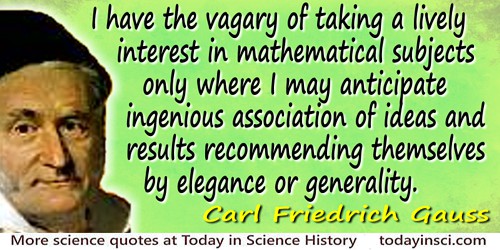
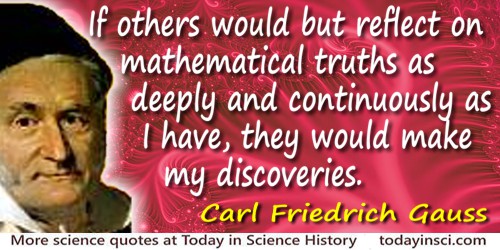
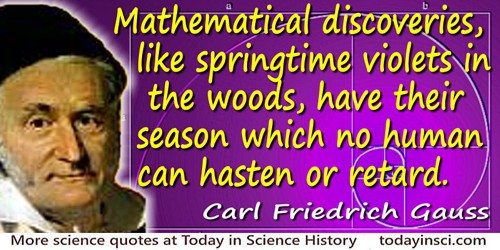
![Carl Friedrich Gauss quote: Mathematics is the queen of the sciences and arithmetic [number theory] is the queen of mathematics.](https://todayinsci.com/G/Gauss_Carl/GaussCarl-Queen500x250px.jpg)
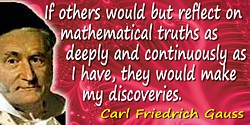
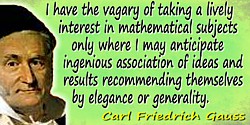
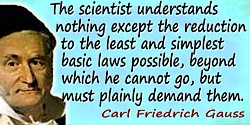
 In science it often happens that scientists say, 'You know that's a really good argument; my position is mistaken,' and then they would actually change their minds and you never hear that old view from them again. They really do it. It doesn't happen as often as it should, because scientists are human and change is sometimes painful. But it happens every day. I cannot recall the last time something like that happened in politics or religion.
(1987) --
In science it often happens that scientists say, 'You know that's a really good argument; my position is mistaken,' and then they would actually change their minds and you never hear that old view from them again. They really do it. It doesn't happen as often as it should, because scientists are human and change is sometimes painful. But it happens every day. I cannot recall the last time something like that happened in politics or religion.
(1987) -- 


